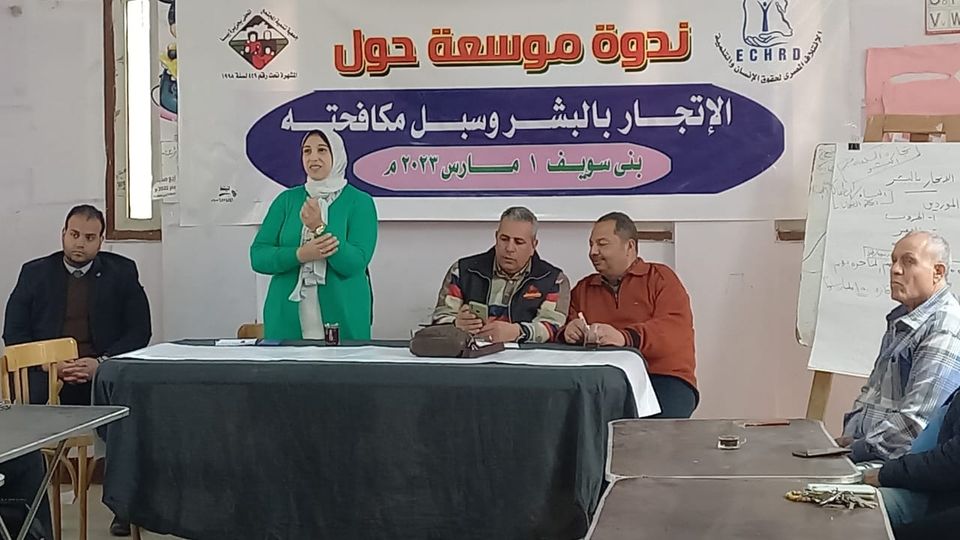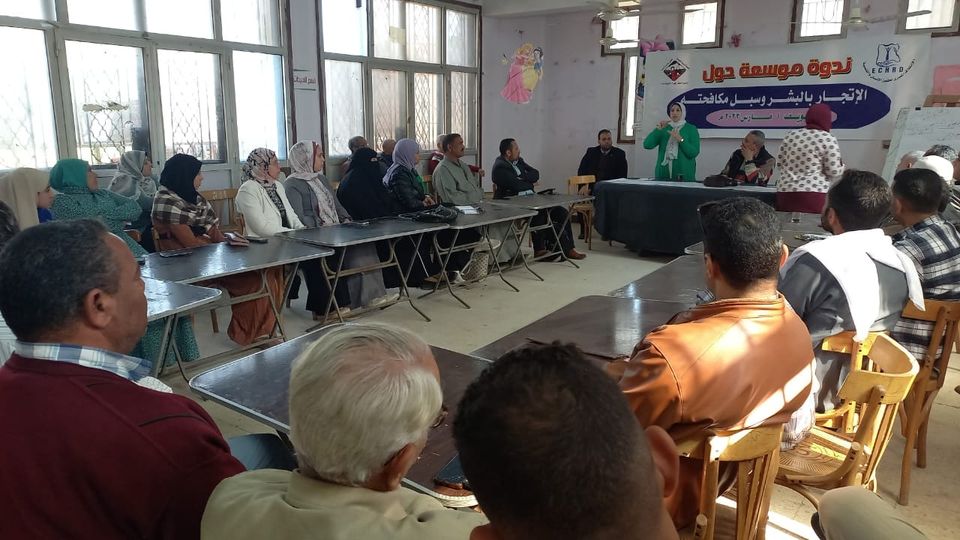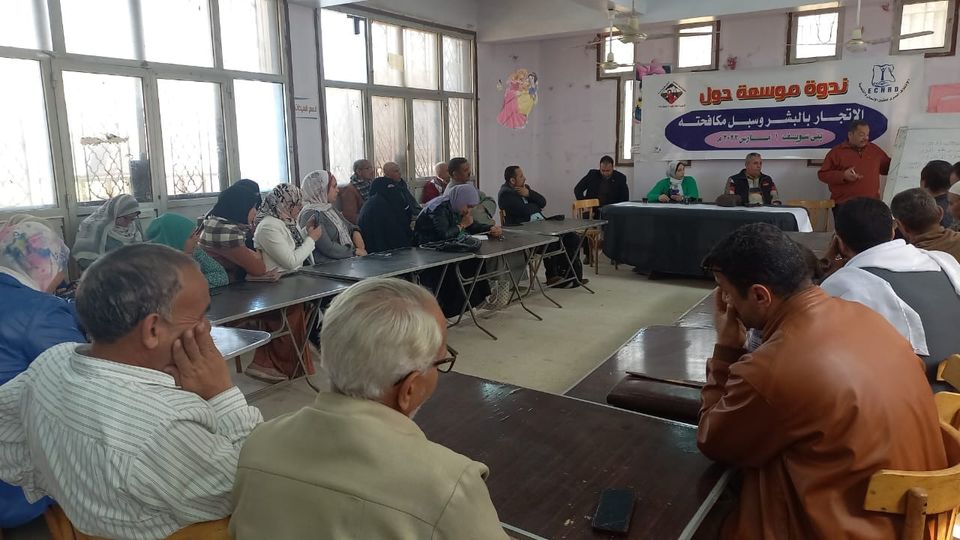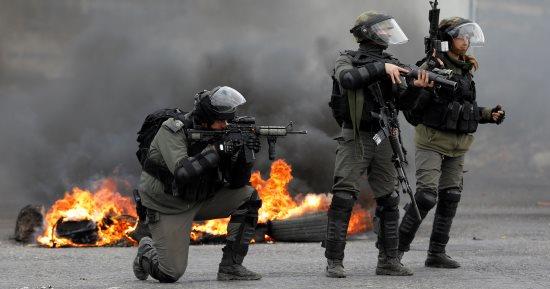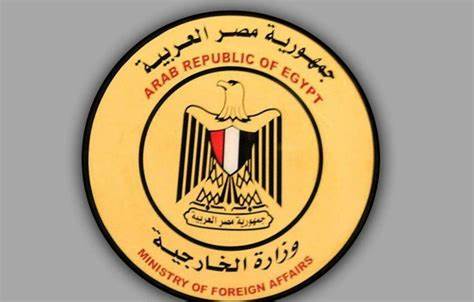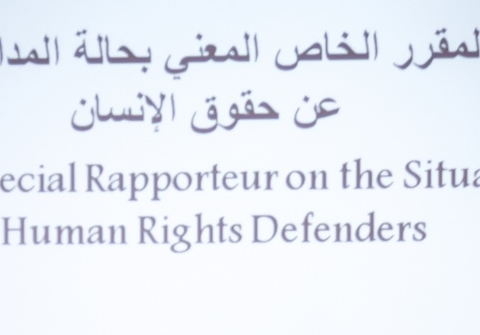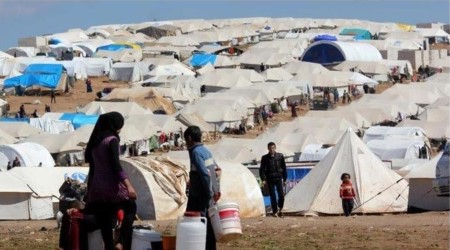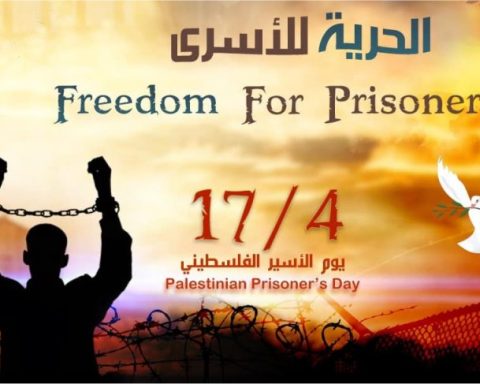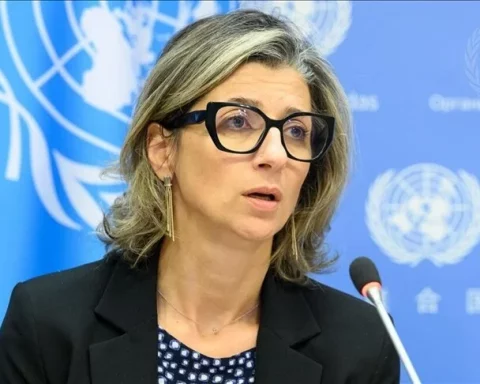Press Release
……………………………………………………
As part of the initiative of the Egyptian Coalition for Development, a seminar was held on Wednesday, 1-3-2023, in the halls of the Local Community Development Association in Gezirt Beba, for a number of 72 developmental and charitable non-governmental associations, members of the ECHRD in Beni Suef governorate on human trafficking and ways to combat it.
This is in the presence of Ms. Nermin Mahmoud Abdel-Azim (Rapporteur of the National Council for Women in Beni Suef), Ibrahim Milad (Director of the Solidarity Department in Baba), Emad William (Head of the NGOs Department at Baba Center), Marquis Qutb (Head of the Social Solidarity Unit in Baba Island), Emad Essa (Coordinator of the ECHRD in Beni Suef Governorate), and Mr. Ashraf Diab (Forum for Development and Human Rights Dialogue) also attended.
Man’s exploitation of his fellow man is one of the worst practices that humans have known since their lives were organized in societies in which some were distinguished from others on the basis of wealth, race, lineage, or power. The harshest form of this exploitation was slavery, which humiliated the dignity of the individual and turned him into a commodity to be bought and sold, such as cattle and merchandise. Therefore, the heavenly laws were concerned with getting rid of slavery, equality between human beings in dignity, rights and duties, and the prohibition of injustice, cruelty and exploitation.
Ashraf Diab (Coordinator of Forum for Development and Human Rights Dialogue) stated that:
There are a number of forms of trafficking in human beings, such as;
- Prostitution.
- Organized crime in more than one country: (cross-border crimes between countries).
- Trafficking and violence against women and children.
- Child exploitation and forced child labour.
- Sexual exploitation.
- Begging.
- Smuggling of women and men.
- Abduction by force and coercion.
- Slavery.
- Forced labour (forced service).
There are negative effects and adverse consequences of the phenomenon of human trafficking, including: - Psychological effects: Such as shame and low self-esteem
- Physical and health effects: such as physical harm caused by premature sexual activity, forced drug use and exposure to sexual transmitted diseases, including HIV/AIDS. Illegal labour may be a source of HIV/AIDS and that illegal workers do not have the means to be treated.
- Economic implications:
Human trafficking imposes enormous economic costs.
Increased unemployment rate, increased money-laundering crimes, widespread shell enterprises, labour market disruption and imbalance between demand and supply.
Rise in food prices due to increased demand, lower per capita living standards, higher inflation rates and workers’ vulnerability to extortion and exploitation.
Infiltration of professionals in human trafficking organized crime gangs into economic settings.
At a time when humanity is showing off its most prestigious stages of scientific, technological and intellectual development. It lavished in the shackles of modern slavery, in which the weak, the simple, and the poor are sold for the purposes of human organ trade, child trade, forced labor, sexual exploitation, buying, selling, and smuggling of immigrants – for the sake of the false dream of wealth on behalf of transnational gangs, all of which are integrated crimes from a legal and Sharia point of view. Against the security of the individual and the state together.
Thus, human trafficking has become a form of slavery in modern times, as it includes a flagrant violation of human rights and fundamental freedoms, in addition to being an international phenomenon, i.e. it is not limited to a specific country, but extends to many countries. The forms and patterns of human trafficking differ from one country to another.
Recently, criminal practices have emerged against children, including the abduction, sale and forced prostitution of children, the widespread trade in human organs and many modern forms of trafficking, all of which constitute a gross violation of human rights.
It is one of the most heinous and serious international crimes against society and humanity, and therefore it has been forbidden and criminalized by all divine laws and international instruments and covenants.
Professor Nermin Mahmoud (Rapporteur of the National Council of Women Beni Suef) confirmed in a lecture entitled “Ways, methods and strategies to combat human trafficking” that there are a number of approaches to combating human trafficking. These include: - Security and political methods:
• Taking adequate measures to reduce the number of “unrestricted visas” or visas not linked with an actual job.
• Imposing strict penalties on those who circumvent the law.
• Confronting (politically and security) smuggling networks as part of national and regional efforts to combat the crime of smuggling of migrants and human trafficking.
• Holding discussions with the deportees returned from abroad in order to identify methods of smuggling them and identify those responsible for them
• Focusing on international cooperation projects between rich and poor countries to support development projects that help reduce unemployment and contribute to alleviating poverty rates.
• Tightening control of borders between countries to prevent infiltrations.
• Strengthening security presence taking into account the volume of crimes committed day and night in places to be covered by security patrols and identifying black spots. - Social, educational and cultural methods:
• Devoting societal efforts to prevent child begging, in particular by taking adequate measures to prevent people smuggling across country’s borders
• Confronting poverty, unemployment and low-income people as effective factors in the prevalence of human trafficking crimes.
• Creating a role for civil society in promoting the application of legislation to prevent trafficking in persons. Any legislation to combat human trafficking must seek to establish coordinating committees to regulate the country’s efforts and oversee the application of the law. With regard to anti-trafficking legislation and clarification of the role of civil society institutions in the protection of victims always, with a view to protecting victims and preventing crime.
• Implementing strategies to combat trafficking in women and children to reduce and eliminate this phenomenon, such as;
Rescue and rehabilitation of women and children.
Protection of women and children.
Raising awareness among women and children.
Raising awareness among parents.
On preventive measures to reduce and prevent the phenomenon of human trafficking, Professor Nermin Mahmoud emphasized the following: –
Focusing on children’s education and making education free.
Increasing education and awareness of children’s rights.
Promoting children’s rights by educating and assisting the family and by raising awareness of parental responsibility towards children.
Creating socio-educational programmes to increase their ability to confront of exploitation and human trafficking networks.
Creating and strengthening social programmes dealing with sensitive subjects concerned with sensitive issues related to sex to help children and their families resist exploitation and human trafficking.
Giving attention to family-related topics.
Developing and strengthening the sense of the importance of the child in the family.
The responsibility for combating human trafficking rests with societies. Societies must cooperate, join hands with each other, provide advice and stand united against human trafficking organizations.
Regarding the most important social measures to combat the phenomenon of human trafficking, the following must be done:
Affirming the role of religious, social, educational institutions in highlighting moral values that advocate the rejection of all forms of human trafficking.
Adopting a media policy to create a climate that rejects all forms of human trafficking and preparing media cadres influencing public opinion to highlight the negative effects of the crime of human trafficking.
Developing social policies to create a public conviction that rejects the practices of elements dealing with human trafficking, inviting civil society organizations to contribute to assisting victims of human trafficking, establishing centres to host them, training those in charge of them, and supporting international cooperation in confronting human trafficking crimes. - Psychological and health methods:
• Providing relief to the victims by organizations, which includes providing them with aid and providing them with a safe haven
• Clarifying the rights of human trafficking victims, safeguarding the victim’s privacy and identity in full confidentiality, enabling victims their views and take them into account, providing the necessary information and the foundations and principles of physical and psychological recovery to human trafficking victims.
• Providing shelter for human trafficking victims. Most anti-trafficking laws stipulate the right of victims to reside in a safe place, such as shelters, and the possibility of “placing the victim in a competent shelter centre… with an accredited entity that undertakes to provide him/her with housing if he/she is found to be in need”
• Strengthening services for human trafficking victims at the Ministry of Health and Human Services, the Office of Crime Victims, and the Ministry of Employment Affairs and Training.
Professor Emad Eisa (Coordinator of the Coalition in Beni Suef) said in a lecture entitled Egypt and confronting human trafficking:
Egypt has taken all necessary steps to combat human trafficking, believing that women and children are the groups most affected by this trade, and that poverty, ignorance and lack of equal opportunities for development are all factors that make individuals more vulnerable to falling victim to trafficking. It has interest in the issue within the framework of its activities in the multilateral field and its positive contribution to the formulation of international standards to address new issues facing the international community, including the multiple forms of transnational organized crime, which includes human trafficking, in addition to striving to deal decisively and effectively with it at the national level.
A. Means of combating human trafficking in Egyptian law:
Egypt is considered one of the first Arab countries to confront the phenomenon of human trafficking by issuing Law No. 64 of 2010 to combat and prevent human trafficking and its executive regulations, as well as issuing Law No. 5 of 2010 regarding the organization of human organ transplantation and its executive regulations, and amending some of its provisions by Law No. 142 of 2017 and published in the Official Gazette in July 22, 2017, with the aim of addressing the crime of trafficking in human organs as one of the patterns and forms of human trafficking, which also organized the process of transferring and transplanting human organs legally – to close the doors to the mafia of organized crime gangs in dealing with human beings as commodities that are traded in a manner that degrades human dignity and is not consistent with accepted human rights principles.
B. Combating human trafficking in Egypt’s Constitution:
The constitutional document issued in 2014 included the general rules by which it addresses human trafficking crimes. It was keen to grant constitutional and criminal protection with regard to the prohibition and criminalization of human trafficking. Among the articles that dealt with this topic are the Article (51) and Article (61), regarding how to donate organs to confront the crime of trafficking in organs, which is a form of human trafficking, and Article (63), and Article (89) which prohibits criminalizes “all forms of slavery, servitude, oppression, forced exploitation of human beings, sex trade, and other forms of human trafficking, and the law criminalizes all of that”. Article 60 also prohibits trafficking in human organs – as a form of trafficking in human beings – which states: “Every human has the right to donate his body organs during his lifetime or after his death by virtue of a documented consent or will. The state commits to the establishment of a mechanism to regulate the rules for organ donation and transplant in accordance with the law. “
Article 80 of the Constitution also establishes special protection for children against sexual and commercial exploitation as forms of human trafficking: “The state shall care for children and protect them from all forms of violence, abuse, mistreatment and commercial and sexual exploitation.”
C. Law No. 64 of 2010 on combating trafficking in human beings:
C- Law No. 64 of 2010 regarding combating human trafficking:
Law No. 64 of 2010 regarding combating human trafficking and its executive regulations relied on criminal and punitive provisions as a model that drew inspiration from many of its provisions and was based on basic axes: prevention and prevention, prosecution and trial, protection of victims (providing assistance and protection to victims), and partnership with organizations Civil society, and international cooperation in all its forms
This law is based on a human rights perspective in dealing with the victims of human trafficking and distinguishing between them and those involved in the crime of trafficking, and how to guarantee and maintain their rights, whether in all stages of investigations or trial and after its completion. The law pays special attention to child victims, and includes distinct legal principles. It is also a model for a new procedural law with regard to universal criminal jurisdiction and respect for the principle of legality when it stipulates double criminalization in both Egyptian and foreign law.
The Egyptian legislator’s approach was based on another set of legislation prior to the promulgation of this law, which directly contribute to strengthening the fight against human trafficking as a flagrant violation of human rights, and deals with specific cases that are characterized as being among the first cases of care (such as children and women). The Egyptian legislator for the victims of human trafficking, a package of rights to guarantee freedom and human dignity, which was mentioned in Chapter Five of Law 64 of 2010 in the chapter on protecting the victims, (which is the right to psychological, physical and moral integrity, and the preservation of personal and identity privacy, and the right to be heard in the two stages of the investigation And the trial, and enlightenment of the relevant legal and judicial procedures, and not counting his consent, and not his criminal or civil responsibility for the crime because he is a victim, and the state guarantees the protection of the victim and creates appropriate conditions for his assistance, rehabilitation and integration into society, and provides suitable places to host him separate from those designated for the perpetrators that allow them to receive them with their families their lawyers and representatives of the competent authorities), and it is also the only Arab legislation that provides for the establishment of a fund to assist victims, and He has a legal personality and reports to the Presidency of the Council of Ministers. A decree of the President of the Republic is issued regarding his powers and financing. He undertakes to provide financial assistance to the victims as a result of the damages resulting from the crime of trafficking in them and the violation of their dignity.
Egypt’s Law No. 64 of 2010 contains the most comprehensive definition of trafficking in human beings. Article 2 of the Code stipulates that: ” A person who commits the crime of human trafficking shall be considered one who deals in any manner in a natural person, including: the sale, offer for sale, purchase, or promise thereof; or the use, transport, delivery, harboring, reception, or receipt, whether within the country or across its national borders; if this occurred through the use of force, violence, or threat thereof; or through abduction, fraud, deception, abuse of power , or exploitation of a position of vulnerability or need; or through a promise to give or receive payments or benefits in exchange for obtaining the consent of a person to traffic another having control over him; or if the purpose of the transaction was exploitation in any of its forms, including: exploitation of acts of prostitution and all forms of sexual exploitation, exploitation of children in such acts and in pornography, forced labor or services, slavery or practices similar to slavery or servitude, or begging or removal of human organs, tissues or a part thereof. “
Egypt has ratified and acceded to most international conventions, instruments and protocols containing relevant provisions and measures related to combating the exploitation of persons, especially women and children. These international conventions have become part of Egypt’s national laws. The relevant authorities of the State are committed to implementing and enforcing the provisions contained therein, in accordance with article 151 of the Egyptian Constitution. The legal and legislative framework in force in the Arab Republic of Egypt also deals with criminalizing and punishing most severe forms of the crime of human trafficking.

